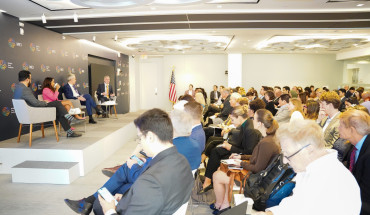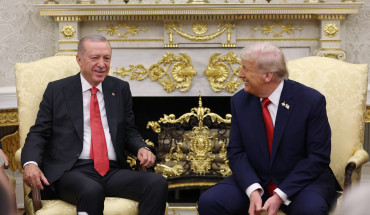Education reform is essential for the continued social and educational development of the United Arab Emirates (UAE).[1] The country has grown considerably over the past decade, and opportunities for business and professional opportunities have expanded. Educational development has been deemed necessary for the citizens of the country to take advantage of such opportunities. This is particularly important to the young citizens of the country, as they are looking to become active participants in their growing and increasing multinational society. In preparation, the country is focused on improving and developing the educational system in order to provide learning experiences that will prepare Emirati youth to be employable and successful in the workplace. More emphasis is being placed on training teachers, adopting new curricula and educational programs, and building collaboration with institutions abroad.[2]
Education reform is also focused on meeting international standards of excellence and building a system according to globally accepted measures. The United Arab Emirates Vision 2021 statement identifies creating a first-rate educational system focused on preparing the next generation for the changing society as a major priority of the next decade, stating, “a progressive national curriculum will extend beyond rote learning to encompass critical thinking and practical abilities equipping our youth with essential skills and knowledge for the modern world.”[3]
Building an internationally regarded educational system in the UAE requires partnerships and collaboration with international higher educational institutions, organizations, centers, programs, and consultants to ensure that the country develops the best system necessary for its citizens. Similar to education reform in many Western nations, the UAE must take into account context, culture, and relevance of reforms for their country. It is important that policies, practices, and programs are adopted to meet the needs of the UAE and its citizens.
Higher education institutions, particularly Colleges of Education, will play a major role in reforming the overall educational system, and improving teaching and learning in schools. They will play key roles in building the partnerships necessary to meet international standards and certification requirements for education. It is important that educational professionals in the UAE develop an understanding of the educational needs of Emirati citizens, and the culture and context of education in the country in order to implement appropriate reform. This is a growing issue of concern to UAE citizens. Although they generally support improvement and modernization of the educational system, they are concerned that the internationalization of education will impact national identity, language, and culture.[4]
Scholars have examined the impact of globalization/internationalism and argued that it is a process of social transformation in which global and local forces interact to shape cultural and economic activities and that this process is the assimilation of global forces into the context of local traditions.[5] This theory has been discussed in the context of globalization in other countries. However, the UAE is unique in that Emirati citizens constitute only 19% of the country’s population.[6] Therefore, it is imperative that educational reforms for the UAE are developed in the context of local culture and are designed to meet the specific needs of the country.
Keeping reforms focused on the needs of the Emirati people will require expertise in culture, curriculum, and pedagogy. It is important that a knowledge base is developed to create a model for education in the UAE that is intellectually and socially appropriate. Models used in other countries have their value and are good blueprints. However, reforms will need to be developed specifically for the UAE and its citizens. Attention will need to be given to three specific things when forming partnerships and collaboration with international entities: contextual appropriateness, cultural responsiveness, and relevancy.
Contextual Appropriateness
Educational reforms for the UAE must be designed in a contextually appropriate manner and take into account the needs of the students that the reforms are being adopted to serve. This ensures that the programs and practices being implemented will be successful and have an overall impact on student learning outcomes. For instance, there is an emphasis in the UAE on learning the English language and providing English language instruction in the schools and universities. UAE students in post-secondary and higher education are largely second-language learners (ELL). Any reforms regarding teaching and learning should take into account effective teaching practices for ELL students, as students who are taught in languages that are different from their own are at an academic disadvantage.
Cultural Responsiveness and relevance
Educational reforms must also be culturally responsive and relevant to be successful with the Emirati people. There is a large body of work on culturally relevant pedagogy and practices.[7] Scholars have pointed out the importance of linking culture to teaching particularly when students are being taught from those whose backgrounds are different from their own.[8] In the UAE, this means incorporating the language, traditions, and customs of the Emirati people into their learning experiences. Most importantly, to be responsive to the academic needs of the students requires a developed understanding of their learning styles and knowledge of how to best complement them.
For example, my experiences teaching in the UAE have taught me that most Emirati students learn better through active engagement. The Emirati culture, like many other cultures, is one of an oral tradition. Linking culture to pedagogy is one of the best methods for preparing students to become academic high achievers. Classroom instruction will complement their culture — making it relevant, responsive, and contextually appropriate. These are major issues to be discussed when forming international partnerships to improve education for Emirati children and youth.
Conclusion
There are many different aspects of context, cultural relevancy, and responsiveness that can be discussed regarding the UAE’s pursuit of education reform. This essay has drawn attention to just a handful of things to consider when fostering partnerships with international entities — keys to ensuring that Emirati learners indeed prosper.
[1]. United Arab Emirates Vision 2021: United in Ambition and Determination; “Education for Development,” Gulf News, July 8, 2010.
[2]. See various articles from Gulf News, including “Teachers across the U.A.E. Will Now Require License,” September 11, 2008; “Accreditation a Must for All Public Schools by 2010,” October 28, 2008; “New Teachers Must Get Teaching Certification: Educators Already Working Will Be Re-trained,” December 20, 2008; “School Inspections Are Proving to Be a Catalyst for Better Education,” April 21, 2009; “Education for Development,” July 8, 2010; “Quality Education is Key for U.A.E. Continued Success,” July 22, 2010.
[3]. United Arab Emirates Vision 2021: United in Ambition and Determination, p. 23.
[4]. Gulf News, “Fostering National Identity is Vital,” December 24, 2009; “Heritage Must Be Taught in Schools,” August 26, 2010; and “Emphasis on Foreign Languages Does Not Contradict UAE Policies,” October 6, 2010.
[5]. A. Giddens, Runaway World: How Globalization is Reshaping Our Lives (New York: Routledge, 2000); D. Held, Global Transformation: Politics, Economics and Culture (Palo Alto, CA: Stanford University Press, 1999); and A.W. Little, “Globalization and Educational Research: Whose Context Counts?,” International Journal of Educational Development, Vol. 16, No. 4 (1996), pp. 427–438.
[6]. World Facts Index, Facts about the United Arab Emirates, http://worldfacts.us/United-Arab-Emirates.htm.
[7]. G. Gay, Culturally Responsive Teaching (New York: Teachers College Press, 2000); T. Howard, “Culturally Relevant Pedagogy: Ingredients for Critical Teacher Reflection,” Theory into Practice, Vol. 35, No. 3 (2003), pp. 195–202; G. Ladson-Billings, “But That’s Just Good Teaching! The Case for Culturally Relevant Pedagogy,” Theory into Practice, Vol. 34, No. 3 (1995), pp. 159–165; G. Mohatt and F. Erickson, “Cultural Differences in Teaching Styles in an Odawa School: A Sociolinguistic Approach,” in H. Trueba, G. Gurthie, and K. Au, eds, Culture and the Bilingual Classroom: Studies in Classroom Ethnography (Rowley, MA: Newbury House, 1981), pp. 105–119.
[8]. Gay, Culturally Responsive Teaching; T. Howard, “Culturally Relevant Pedagogy: Ingredients for Critical Teacher Reflection,” pp. 195–202; Ladson-Billings, “But That’s Just Good Teaching! The Case for Culturally Relevant Pedagogy,” pp. 159–165; Mohatt and Erickson, “Cultural Differences in Teaching Styles in an Odawa School: A Sociolinguistic Approach,” pp. 105–119.
The Middle East Institute (MEI) is an independent, non-partisan, non-for-profit, educational organization. It does not engage in advocacy and its scholars’ opinions are their own. MEI welcomes financial donations, but retains sole editorial control over its work and its publications reflect only the authors’ views. For a listing of MEI donors, please click here.













